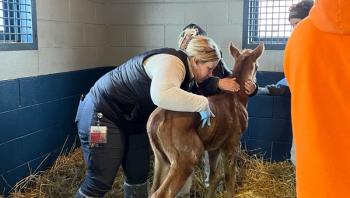
Budget Forecast: Gloomy with some bright spots
Seattle -- AVMA treasurer projects $2.8 million loss this year, $90,000 profit in 2010.
Seattle
-- A $2.8 million loss is projected for the 2009 AVMA budget, but 2010 could see a small profit.
While the forecast is “certainly disheartening,” more than $22 million in reserves kept in place for difficult economic times will be there for this “persistent recession,” says Bret Marsh, American Veterinary Medical Association (AVMA) treasurer. “Despite the gloomy economic times, the AVMA has had its share of bright spots,” he adds.
The AVMA is $235,500 ahead of where it was last year with dues and $905,000 ahead of last year with convention registration. And the group’s investment portfolio is up 7.03 percent for 2009 as of June, Marsh says.
While none of that is enough to make up for the nearly $7 million loss the association took in 2008 when the economy tanked, or the projected loss for 2009, it does mean the AVMA will be in a better position entering 2010.
Next year’s budget calls for the AVMA to spend nearly $1 million less than in 2009. The 2009 budget was $29.6 million, while the projected 2010 budget is $28.6 million. If all goes according to plan, the association should earn $90,049 for 2010 — much less than in previous years but still positive.
Since 1999, the largest income for the association was in 2004 when it brought in $2.7 million. In fact, AVMA took in more than $1 million each year for seven of the past 11 years, falling short of that only in 2001, 2002, 2008 and now 2009. The last two years are the only ones with a negative balance during that time.
In order to turn a profit in 2010, AVMA was careful to cut expenses.
“During my 10 years as treasurer, the 2010 budget has required the most work to prepare,” Marsh says. “It also required the most compromise.“
While increasing member dues would be one sure-fire way to increase income — dues make up 57 percent of the AVMA’s income -- Marsh says it won’t be done.“This budget is right for this time,” he says. “It would be easy to ask for a dues increase, but it wouldn’t be right.”
Marsh may have to go back to the books, however, after House of Dele-gate members voted to restore stipends for travel expenses that had been cut by nearly two-thirds as a cost-saving measure.
The Committee on Finance proposed restoring reimbursement for up to three nights’ lodging and airfare. The measure, approved 92.1 percent to 7.9 percent, will cost up to $175,000.
Delegates suggested increasing dues or dipping into the reserves to cover the travel stipends.
“That money was set aside for a rainy day,” says Alaska delegate Harold Spalding.
“And it’s raining.”
Newsletter
From exam room tips to practice management insights, get trusted veterinary news delivered straight to your inbox—subscribe to dvm360.






